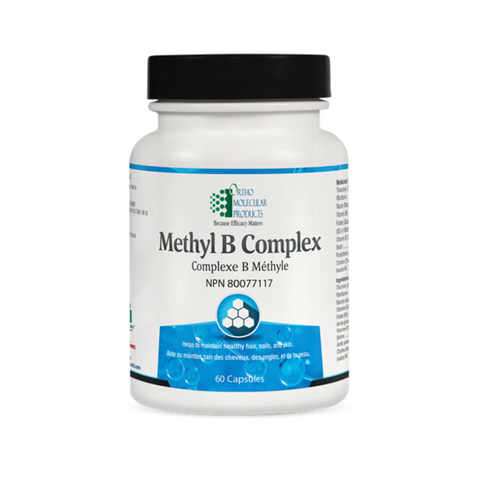

Ortho Molecular Products Methyl B Complex
Helps to maintain the body's ability to metabolize nutrients.
Helps to prevent biotin, vitamin B12, vitamin B6, thiamine, riboflavin and pantothenic acid deficiencies.
Folate
Folate is a water soluble member of the B complex vitamins that is critical for maintaining optimal methylation. Folate is found naturally in foods such as fruits and dark leafy vegetables, but can be easily destroyed by cooking or processing. Additionally, enzyme defects, malabsorption and congenital deficiency of 5-methylenetetrahydrofolate reductase (5-MTHFR), an enzyme required for the conversion of folic acid to its bioactive form 5-methyltetrahydrofolate (5-MTHF), can result in an impaired ability to activate folic acid. In individuals with a genetic defect of this enzyme, supplementation with 5-MTHF has been shown to be beneficial. 5-MTHF is required as a methyl group donor for the production of mood regulating neurotransmitters such as serotonin, the synthesis of melatonin, as well as DNA production and repair. 5-MTHF also donates its methyl group to vitamin B12 (cobalamin), forming methylcobalamin. Methylcobalamin helps convert the amino acid metabolite homocysteine into the amino acid methionine.
Thiamine
While naturally abundant in whole grains, thiamine is lost in many of the over-processed grains commonly consumed today. Thiamine is an essential co-factor in the production of ATP in the cells' Kreb's cycle, and is also needed for the metabolism of fats, proteins and carbohydrates.
Riboflavin
Riboflavin is a precursor to flavin adenine dinucleodtide (FAD) and flavin mononucleotide (FMN), both of which are central to energy production and intermediary metabolism. Riboflavindepleted cells have been found to display signs of greater oxidative stress and disrupted energy generation.
Vitamin B6
Vitamin B6 is involved in over 100 enzymatic reactions in the body and is essential in methylation, for the breakdown of homocysteine.
Vitamin B12
Vitamin B12, found only in organ meats, seafood and egg yolks, often becomes deficient in vegan and vegetarian diets. The vitamin is essential for the metabolism of fats and carbohydrates, the synthesis of proteins, and energy metabolism.
Biotin
Synthesized by the bacteria in the gut in addition to certain foods, biotin and its cofactors are involved in metabolism of fatty acids, amino acids and utilization of B vitamins.
Pantothenic Acid
Pantothenic acid and its biologically active derivative, CoA, are essential to the synthesis of fatty acids, membrane phospholipids, amino acids, steroid hormones, and energy production.
Medicinal Ingredients (per capsule)
Biotin ……………………………………………………………………………………………… 75 mcg
Vitamin B12 (Methylcobalamin) ……………………………………………. 500 mcg
Folate (Quatrefolic®(6S)-5-Methyltetrahydrofolic acid, glucosamine salt)………. 400 mcg
Inositol……………………………………………………………………………………………… 50 mg
Riboflavin…………………………………………………………………………………………. 50 mg
Niacin (Niacinamide) ……………………………………………………………………. 50 mg
Vitamin B6 USP (Pyridoxine Hydrochloride) …………………………… 50 mg
Pantothenic acid USP (Calcium D-Pantothenate) …………………. 50 mg
Thiamine USP (Thiamine Hydrochloride)………………………………… 50 mg
Choline (Choline Bitartrate)………………………………………………………… 20 mg
Recommended Dose
Adults: Take 1 capsule per day with food.




